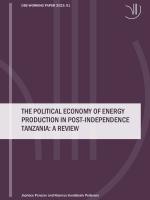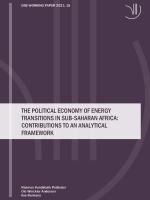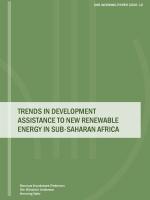The political economy of energy production in post-independence Tanzania
In Tanzania, energy production is a matter of great political significance. Despite government commitment to promote non-hydro renewable energy, like solar and wind deployment, so far has been limited. Large, non-hydro, renewable projects have not yet attracted adequate government interest to get implemented. This new DIIS Working Paper suggests that the prioritisation of different sources of energy has been influenced by major shifts in the country’s broader development policy priorities. Access to electricity has in turn been scaled up.
These developments point to the importance of political economy factors influencing energy sector development in Tanzania. The paper examines how such factors have influenced government energy source choice and, more importantly, how renewable energy has featured in Tanzania’s energy politics since independence. The paper is based on a review of existing academic and grey literature on energy sector development, reform, and politics throughout the period from independence in 1961 to 2021.
DIIS Experts







